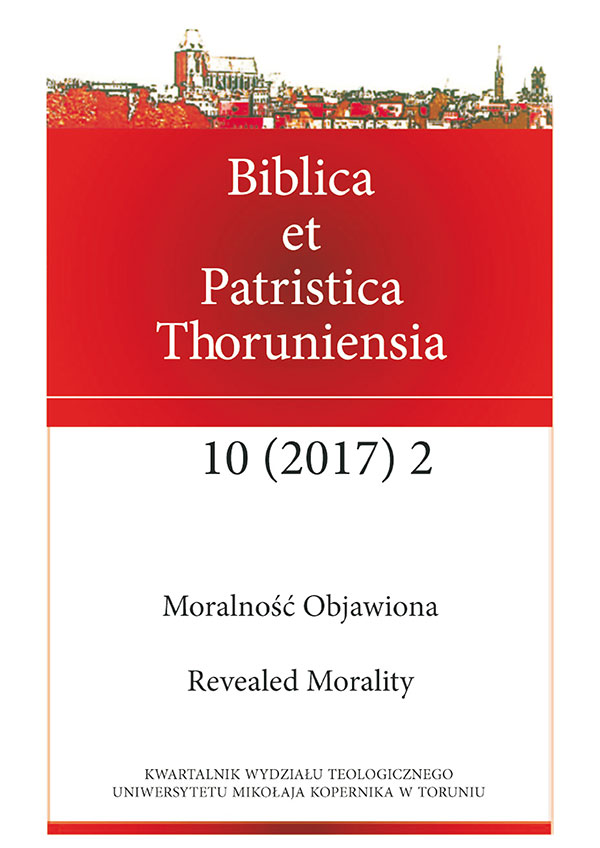Conscience in the Holy Spirit in the Light of Rom 9,1
DOI:
https://doi.org/10.12775/BPTh.2017.009Keywords
Christ, truth, Holy Spirit, conscience, witness, autonomy, probity, infallibility, ChurchAbstract
In Rom 9,1, Paul demonstratively proclaims personal righteousness as a servant of Jesus Christ and the Apostle of the Gospel (1: 1). Three autonomous entities: Christ, conscience and the Holy Spirit are called the witnesses authenticating the truthfulness of the testimony given. Christ is his Lord, and he is his servant. As a servant he is filled with the truth of his Lord. Christ the Lord is a credible witness of his righteousness, because he is its source in him. The truth of the above confession is confirmed by his conscience. As an internal autonomous tribunal (co-witness) is able to recognize good and evil according to the requirements of the known truth of Christ – sharing with God. For this reason, it possesses the respect and authority to accuse and judge effectively on its basis all the thoughts, words and actions of the Apostle, resolving definitively whether they are compatible with it or not; by the same, whether they are good or bad in the judgment of God, consequently, if they close or open the way to his eternal glory. The Holy Spirit is the creator of the righteousness of the Apostle, the harmonious coherence of all his words and deeds, the thoughts of consciousness (I/nous) and conscience with the truth of Christ, the salvific will of God realized in the Church by the power of his Spirit, (1 Kor 2,10) knows the truth of Christ perfectly, which, in turn, examining the conscience, renews it and animates it. The Holy Spirit, therefore, according to the Apostle, plays a decisive role in the creation and authorization of his personal righteousness and as the third witness confirms with absolute certainty the credibility of the two previous.
References
Aletti J.-N., List do Rzymian w: Międzynarodowy Komentarz do Pisma Świętego. Komentarz katolicki i ekumeniczny na XXI wiek, W.R. Farmer (red.), tłum. M. Żurowska, Warszawa 2000, s. 1411–1455.
Barret C.K., The Epistle to the Romans. Black’s New Testament Commentary, London 19912.
Boice J.M., Romans. God and history, New Testament Commentary, v. 3, Grand Rapids 1993.
Haldane R., Exposition of the Epistle to the Romans, Escondido 1999.
Janowski B., Der Mensch im alten Israel, Zeitschrift für Theologie und Kirche, 102 (2005), s. 143–175.
Jewett R., A Commentary on the Book of Romans, Augsburg 2007.
Johnson L.T., Reading Romans. A Literary and Theological Commentary. Reading the New Testament Series, Macon 2001.
Langkammer H., List do Rzymian. Pismo Święte Starego i Nowego Testamentu, Lublin 1999.
MacArthur J.F., Romans 1–8. New Testament Commentary, Chicago 1994.
Schlier H., Der Römerbrief. Herders Theologischer Kommentar zum Neuen Testament. Sonderausgabe, Freiburg–Basel–Wien 2002.
Stępień J. Syneidesis (sumienie) w antropologii św. Pawła, w: Człowiek we wspólnocie Kościoła. Księga Pamiątkowa na 25 lecie ATK, red. L. Balter, Warszawa 1979, s. 162–201.
Szymik S., Starotestamentowe, judaistyczne i grecko-rzymskie pojęcie sumienia, Forum Teologiczne XV (2014), s. 7–21.
Downloads
Published
How to Cite
Issue
Section
License
CC BY ND 4.0. The Creator/Contributor is the Licensor, who grants the Licensee a non-exclusive license to use the Work on the fields indicated in the License Agreement.
- The Licensor grants the Licensee a non-exclusive license to use the Work/related rights item specified in § 1 within the following fields: a) recording of Work/related rights item; b) reproduction (multiplication) of Work/related rights item in print and digital technology (e-book, audiobook); c) placing the copies of the multiplied Work/related rights item on the market; d) entering the Work/related rights item to computer memory; e) distribution of the work in electronic version in the open access form on the basis of Creative Commons license (CC BY-ND 3.0) via the digital platform of the Nicolaus Copernicus University Press and file repository of the Nicolaus Copernicus University.
- Usage of the recorded Work by the Licensee within the above fields is not restricted by time, numbers or territory.
- The Licensor grants the license for the Work/related rights item to the Licensee free of charge and for an unspecified period of time.
FULL TEXT License Agreement
Stats
Number of views and downloads: 1298
Number of citations: 0



